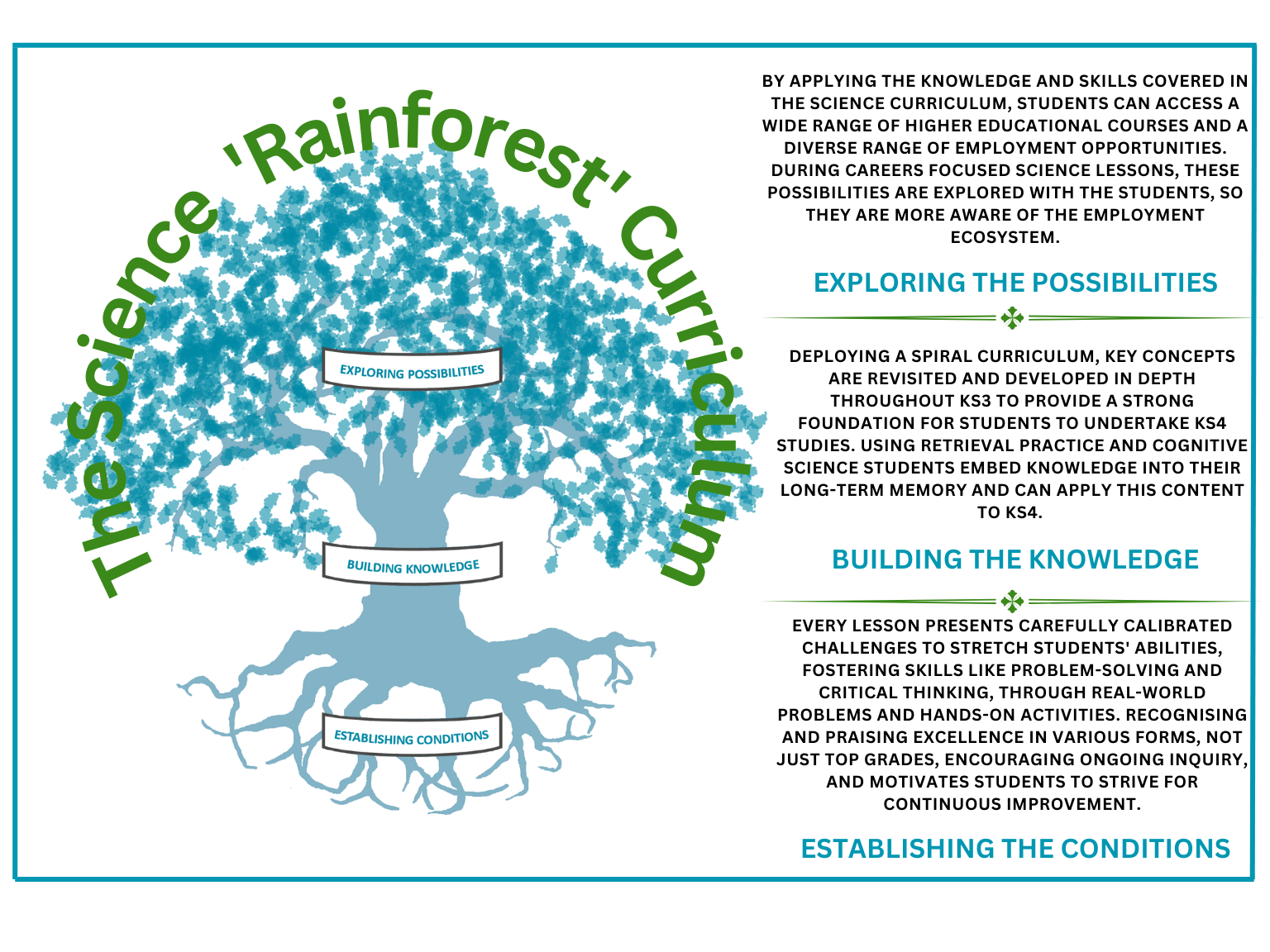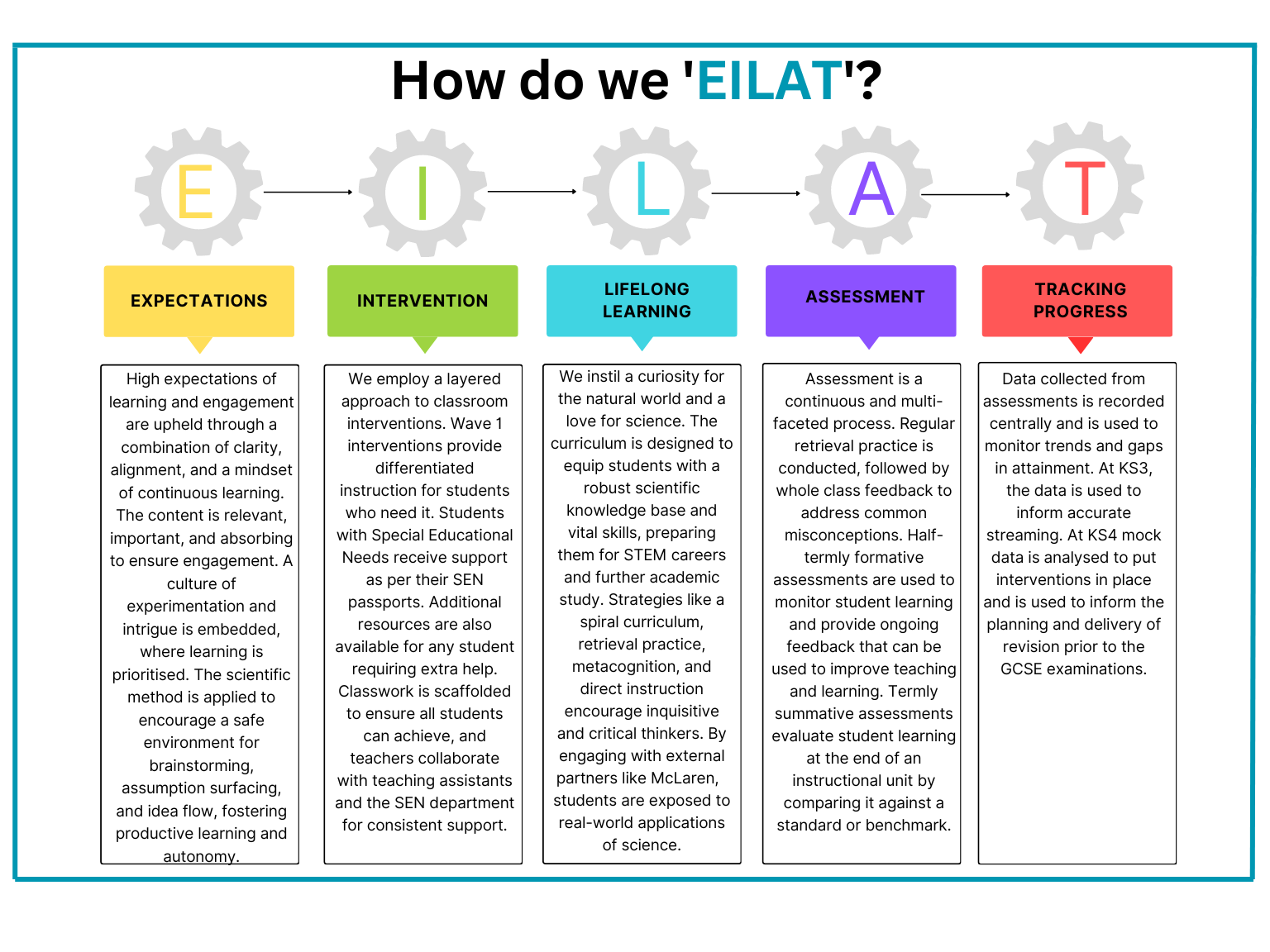Science
‘Always question, always wonder'
Intent
The Science Department is passionately committed to fostering a curiosity for the natural world and inspiring a lifelong love for science in our students. Our curriculum's primary aim is to equip students with a robust scientific knowledge base and the vital skills needed to excel in various STEM careers, alongside promoting further academic study. Employing teaching strategies like a spiral curriculum, retrieval practice, meta-cognition, and direct instruction, we aim to encourage inquisitive, problem-solving minds and critical thinkers. We strive to create a learning environment that promotes accessibility and inclusivity, underpinned by personalised interventions that allow each student to reach their fullest potential. Our curriculum aligns with the school's overarching vision by emphasising STEM careers, engaging with renowned external partners like McLaren, and highlighting diversity within Science.
 Meta-concepts
Meta-concepts
The following meta-concepts underpin our curriculum:
- Energy- encompasses the study of energy, its forms, transformations, conservation, and its role in various scientific phenomena.
- Interactions and Systems- The interactions between components within systems, such as ecosystems, organisms, or chemical reactions. It involves understanding how different elements within a system influence and depend on each other.
- Structure and Function- The relationship between the structure and function of biological systems, chemical compounds, or physical entities. It involves examining how the properties and organisation of components contribute to their specific functions.
- Scale and Magnitude- The significance of scale in scientific contexts. It includes concepts related to the microscopic and macroscopic scales, such as the organisation of matter, the size of organisms, or the scope of environmental processes.
- Change and Stability- The concept of change and stability in scientific phenomena. It includes understanding factors that cause change, identifying patterns and trends, and recognising the conditions necessary for stability.
Implementation
The science curriculum is implemented in the form of a spiral curriculum. Across the curriculum students study a broad range of topics that link via the aforementioned meta-concepts. The curriculum starts in Year 7 builds upon the knowledge and skills gained at KS2, whilst also ensuring that all students develop strong foundational knowledge to build upon year on year. This development continues throughout all five years of the science curriculum. Alongside this substantive knowledge, students complete practical activities which enhance their knowledge and allows them to practice and develop disciplinary knowledge. Literacy is also a big focus of the science curriculum; students gain not only an understanding and appreciation for scientific terminology, but also the skills surrounding scientific and numerical literacy.
Below is an outline as to how the topic structure was developed and how it is implemented in each year group.
Year 7 – Six lessons per fortnight.
Students are introduced to basic concepts in the major areas of science: physics (forces, energy, waves, magnetism), chemistry (particles, the periodic table, chemical reactions), and biology (cells, ecosystems, genetics). Students also develop the foundational toolkit of skills to be able to safely and accurately collect data via investigations.
Year 8 – Six lessons per fortnight.
These same concepts are revisited, and students' understanding is deepened. For example, they study energy again but move beyond the basics. Similarly, in biology, they move beyond cells to systems in the body, and in chemistry, they navigate the periodic table in more depth. Additional topics are also covered, which build upon and extend the students knowledge of the scientific world around them.
Year 9 – Six lessons per fortnight split into Biology, Chemistry and Physics.
Now, the disciplines of biology, chemistry, and physics are explicitly distinguished, and students study deeper aspects of the concepts introduced earlier. For instance, they revisit cells in biology but with an added layer of complexity, including infection and response.
Year 10 and 11 – Nine lessons per fortnight, split equally into Biology Chemistry and Physics.
These years are focused on advanced topics in each of the disciplines. However, previous concepts are still reinforced. For instance, energy is studied again, but now in the context of bioenergetics and quantitative chemistry. There is a key focus on applying knowledge to unfamiliar contexts, such as they will need to in examinations, but also in further study and STEM careers.
The goal throughout these years is not merely to teach facts but to give students the opportunity to apply their understanding in increasingly complex contexts. Exam technique and retrieval of previous topics are continuously emphasised, allowing students to integrate and apply their knowledge, reinforcing the spiral nature of the curriculum.

GCSE specification- Combined Science Trilogy
Impact
Through the deployment of the spiral curriculum, students will be comfortable with extending and building upon existing knowledge. This allows students to constantly be deepening their understanding over time, this will aid the students in being able to succeed in STEM careers and further academic study. With the students being comfortable in their understanding, the spiral nature of the curriculum aids memory as students have to retrieve knowledge from previously learnt content , a useful ability in many real-world applications.
The embedding of skills and disciplinary knowledge enables students to continue to be able to think critically and solve problems as they lead their lives as young adults in the workplace.
Ultimately, through the continued embedding of encouraging students to appreciate and question the world around them, the curriculum will create young adults with a lifelong love of learning. Not only is this due to the range of inspiring content taught, the revisiting of content through the spiral allows students to see their own self-growth, fostering a sense of achievement and curiosity that inspires a lifelong love for science.



